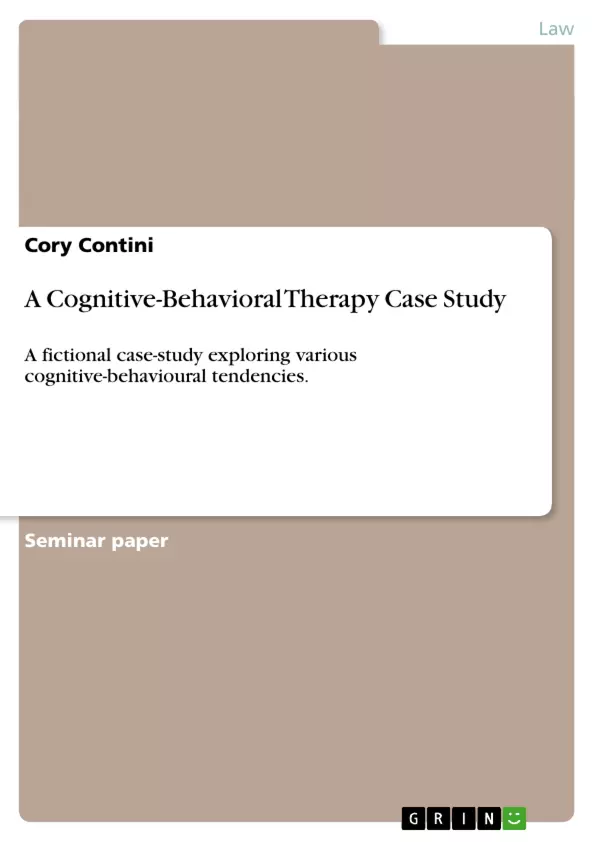It is easy to see why cognitive-behavioural theory is so popular. It takes into account the cognitive aspect of behaviour and how individuals act, which gives it a lot of credibility in the counselling field. There are many specific and general treatments that can be used, as well as being able to utilize both individual and group counselling. Furthermore, it has been widely used for drug offenders, sex offenders, and young offenders. A theory that has so many implications must be fundamentally and structurally sound to withstand problem and criticisms from many different outlets.
Inhaltsverzeichnis (Table of Contents)
- A Cognitive-Behavioural Therapy Case Study
- Introduction
- Cognitive Behavioural Therapy
- Cognitive Distortions
- Treatment
- Cognitive Restructuring
- Conclusion
Zielsetzung und Themenschwerpunkte (Objectives and Key Themes)
This case study examines the application of cognitive-behavioural therapy (CBT) to a client named Mark Anderson, who struggles with addiction and criminal behavior stemming from chronic pain. The study aims to illustrate the effectiveness of CBT in addressing these issues and to highlight the role of cognitive distortions in shaping maladaptive thoughts and behaviors.
- Cognitive-behavioural therapy as a treatment for addiction and criminal behavior
- The role of cognitive distortions in shaping maladaptive thoughts and behaviors
- The application of CBT techniques to address specific cognitive distortions
- The importance of cognitive restructuring in transforming maladaptive thoughts and behaviors
- The impact of CBT on the client's overall well-being and rehabilitation
Zusammenfassung der Kapitel (Chapter Summaries)
- The case study introduces Mark Anderson, a man who develops chronic pain due to his work. His initial attempt to manage his pain through marijuana use spirals into a broader addiction, leading to criminal behavior and personal turmoil. The chapter delves into the events leading up to Mark's arrest and the subsequent intervention of the criminal justice system.
- This chapter provides an overview of cognitive-behavioural therapy (CBT) as a therapeutic approach. It explores the core principles of CBT, emphasizing the impact of individual cognition on behavior and the potential for modifying behaviors through systematic learning principles.
- The chapter examines the concept of cognitive distortions, outlining their role in creating dysfunctional behaviors. Specific distortions are discussed, including all-or-nothing thinking, overgeneralization, emotional reasoning, and labeling/mislabeling.
- This chapter delves into the treatment plan for Mark Anderson, focusing on cognitive restructuring techniques aimed at correcting cognitive errors and promoting healthier thought patterns. The chapter highlights the therapist's role in guiding Mark through this process.
Schlüsselwörter (Keywords)
The key words in this case study are cognitive-behavioural therapy, addiction, criminal behavior, cognitive distortions, emotional reasoning, labeling, mislabeling, cognitive restructuring, and treatment.
- Arbeit zitieren
- Cory Contini (Autor:in), 2009, A Cognitive-Behavioral Therapy Case Study, München, GRIN Verlag, https://www.hausarbeiten.de/document/230617


